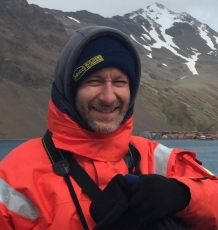
Professor Daniel Mayor
Professor of Aquatic Biology and Biogeochemistry
D.J.Mayor@exeter.ac.uk
2728
Hatherly B9
Hatherly Building, University of Exeter, Prince of Wales Road, Exeter, EX4 4PS, UK
Overview
Dr Daniel J Mayor (@oceanplankton) • Instagram photos and videos
Qualifications
2001 – 2005: PhD in Physiological Ecology, University of Southampton
1996 – 1999: BSc Hons in Marine Biology, University of Newcastle upon Tyne
Career
Career to date:
2023: Professor, University of Exeter
2022: Associate Professor, University of Exeter
2022 – to date: Senior Visiting Fellow, National Oceanography Centre, UK
2019 – 2022: Marine Ecosystems Subgroup Leader, National Oceanography Centre, UK
2017 – 2022: Senior Principle Investigator (B4), National Oceanography Centre, UK
2015 – 2017: Principle Investigator (B5), National Oceanography Centre, UK
2014 – 2015: Senior Lecturer, University of Aberdeen
2014 – to date: Honorary Research Fellow, James Hutton Institute
2013 – 2014: Lecturer, University of Aberdeen
2012: Awarded Fellowship of the Challenger Society for Marine Science
2010 – 2013: NERC Independent Research Fellow
2007 – 2010: Leverhulme Postdoctoral Research Fellow
2005 – 2007: SARF Postdoctoral Research Fellow
Research group links
Research
Research interests
I am an observational and experimental biologist, and I enjoy a balance of work at sea and in the laboratory. Research in our group is broadly concerned with understanding how organisms drive global biogeochemical cycles and how they are influenced by environmental change. A major part of our work involves collaborating with biogeochemical modellers, translating knowledge of ecology and physiology into mechanism-focussed models that help reduce uncertainty in our projections of how the ecological and biogeochemical functioning of the global ocean will change in the future.
Much of our work focuses on marine copepods, tiny relatives of crabs and lobsters that are probably the most numerous animals on our planet. One estimate suggests that there are 1,300,000,000,000,000,000,000 copepods in the global ocean - two orders of magnitude more than all of the insects on land. Copepods drive one of the largest animal migrations on Earth, moving millions of tonnes of biomass into the deep ocean during the food-poor winter and reascending to feed in surface waters the following spring. This, and many other copepod-driven processes, help transport carbon down into the deep sea, where it may be locked away from the atmosphere for hundreds, or even thousands of years - thereby helping to regulate global climate. Given the importance of copepods in the global carbon cycle, there has never been a more urgent need to understand how they will be affected by environmental change.
Research projects
Current projects (please feel to contact me for further details):
IDAPro: Integrating Drivers of Atlantic Productivity (NERC; 2023-2026).
PARTITRICS: Particle transformation and respiration influence on ocean carbon storage (NERC; 2023-2026).
Ocean ICU: Improving understanding of the ocean carbon cycle (EU; 2022-2027).
C-QWIZ: Future global ocean Carbon storage: Quantifying warming impacts on zooplankton (NERC; 2022-2025).
BIOPOLE: Biogeochemical processes and ecosystem function in changing polar systems and their global impacts (NERC; 2022-2027).
DINOTROPHY: Deuterium in Organic Biomarkers: A new tool to investigate the role of Marine Mixotrophy in the Global Carbon Cycle (BBSRC; 2021-2025).
MISSION ATLANTIC: Towards the Sustainable Development of the Atlantic Ocean: Mapping and Assessing the present and future status of Atlantic marine ecosystems under the influence of climate change and exploitation (EU; 2020-2025).
Recently completed projects:
MEESO: Ecologically and economically sustainable mesopelagic fisheries (EU, 2019-2024).
Publications
No publications found



